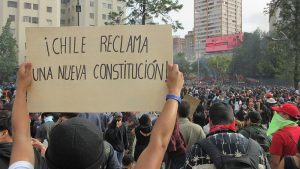Latin American nations hold some of the highest income inequality indexes in the world. Chile, has the highest income inequality gap of Western Democracies. This article attempts to dissect the deeply rooted issues that have produced the massive mobilization protests at the end of 2019. The article cites an increase in bus fares as the cause for the massive protests. Protestors argue that the increase in subway fares was the final straw. Despite the economic stability at the macro-economic level, Chilean wages are simply not enough to cover the high cost of living.
A possible explanation for the rising discontent in the Andean country can be attributed to the economic model established during Augusto Pinochet’s dictatorship. Chileans have been consistently sold the capitalist Neo-liberal model. This model emphasizes the production and exportation of raw materials. The continuous extraction of raw materials has damaged various regions of the country, leaving them as “sacrificial zones”, usually relocating indigenous or low income communities. While there is an increase of jobs, under this model, most jobs are temporary. This has all been allowed by the government that still adheres to the constitution established during the dictatorship, as one of the conditions for the transition to democracy. Neo-liberalism allows the rich to get richer, and the poor to remain poor.

Scholars are now using Chile as a case study to focus on the longterm internal effects of Neo-liberalism. In Camila Jara’s, “Democratic Legitimacy under Strain? Declining Political Support and Mass Demonstrations in Chile” is an example of scholarly work that critiques this economic system “supported” by democracy. This article examines in depth how Chileans disapprove of the current economic and political systems despite the image of functioning democracy in the Andean country. In this study, over the decades since the transition to democracy, Chileans find their political institutions as unfavorable. Many studies are now covering the long term effects of Chilean Neo-liberalism.
–
References:
Jara, Camila. “Democratic Legitimacy under Strain? Declining Political Support and Mass Demonstrations in Chile.” Revista Europea De Estudios Latinoamericanos Y Del Caribe / European Review of Latin American and Caribbean Studies, no. 97 (2014): 25-50. Accessed January 25, 2020. www.jstor.org/stable/23972438.
Cortés, A. (2020, January 23). The Chilean October: neoliberalism was born and will die in Chile? Retrieved January 25, 2020, from https://www.opendemocracy.net/en/democraciaabierta/el-octubre-chileno-el-neoliberalismo-nace-y-muere-en-chile-en/